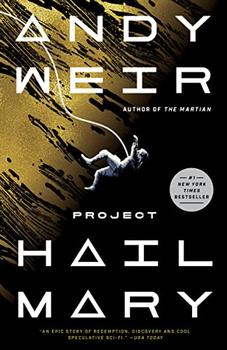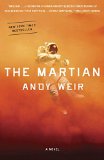Summary | Excerpt | Reviews | Beyond the book | Read-Alikes | Genres & Themes | Author Bio

Imagine, if you will, waking up to a mechanized voice incessantly asking, "What is two plus two?" As it intrudes on your consciousness you realize you're naked, lying on some sort of wall-mounted bed, you have tubes coming out of every orifice, and you share the sterile space with two people who are obviously long dead. To top it off, you can't remember who you are, what this facility is, or why you're there. So begins Andy Weir's science fiction adventure, Project Hail Mary.
Our narrator for this entertaining romp is Ryland Grace, and once he can articulate the answer to the simple math problem, he's able to determine he's on a spacecraft. As he familiarizes himself with his surroundings, he has flashbacks that remind him who he was before he left Earth — and what exactly a junior high science teacher is doing alone on a rocket ship light-years from his home planet. His bursts of insight continue throughout the novel, helping him problem solve and eventually revealing shocking information about his presence aboard the craft.
Weir employs a tried-and-true formula to weave his tale that is much like the structure he used in his debut novel, The Martian (and appearing as well in countless space operas like the Flash Gordon or Doctor Who series). A life-threatening crisis presents itself, the hero comes up with some sort of ingenious solution, and then they do their best to survive in spite of the odds; rinse and repeat. There are a number of factors that keep this novel from feeling trite, however. First and foremost is the central character, Ryland Grace, whose narration is captivating, funny and informative. He comes across as the cool teacher you wish you'd had growing up, able to explain complicated concepts while retaining a sense of humor:
Light is a funny thing. Its wavelength defines what it can and can't interact with… That's why there's mesh over the window of a microwave. The holes in the mesh are too small for microwaves to pass through. But visible light, with a much shorter wavelength, can go through freely. So you get to watch your food cook without melting your face off.
As always with Weir's writing, I'm impressed with his reliance on credible technologies and his ability to explain these complex notions to even scientifically illiterate readers such as myself. With the exception of one major plot point that occurs about a quarter of the way through the novel, I never found myself thinking, "Well, that seems unlikely." Sometimes these scientific expositions go on a little too long for my taste, but generally I appreciated feeling like the problems Grace encountered and the solutions he came up with were plausible.
One criticism often lobbed at Weir's previous novels is that his main characters are quite foul-mouthed. He seems to have taken this critique to heart in Project Hail Mary, as Grace truly curses just once (and it fits, given the circumstances). It's not that he doesn't use expletives at all, but as someone who spends most of his time with kids he defaults to G-rated invectives like "pain in the patoot" and "the poop hit the fan." Although at times the language feels a little forced, it's probably a wise move, as it may allow parents and teachers to feel more comfortable recommending the book to younger audiences. And as written, it's certainly appropriate for teen readers.
I've had serious love for Weir's writing since The Martian, and Project Hail Mary has only added to my high opinion of his work. Those who count themselves among his fans will undoubtedly be delighted with the book, and I unhesitatingly recommend it to anyone who enjoys well-written, creative science fiction. It's sure to be another huge hit for this author, and I can't wait to read whatever he comes up with next.
![]() This review was originally published in The BookBrowse Review in June 2021, and has been updated for the
October 2022 edition.
Click here to go to this issue.
This review was originally published in The BookBrowse Review in June 2021, and has been updated for the
October 2022 edition.
Click here to go to this issue.

If you liked Project Hail Mary, try these:

by Emily St. John Mandel
Published 2015
An audacious, darkly glittering novel set in the eerie days of civilization's collapse, Station Eleven tells the spellbinding story of a Hollywood star, his would-be savior, and a nomadic group of actors roaming the scattered outposts of the Great Lakes region, risking everything for art and humanity.

by Andy Weir
Published 2014
Six days ago, astronaut Mark Watney became one of the first people to walk on Mars. Now, he's sure he'll be the first person to die there.
Your guide toexceptional books
BookBrowse seeks out and recommends the best in contemporary fiction and nonfiction—books that not only engage and entertain but also deepen our understanding of ourselves and the world around us.